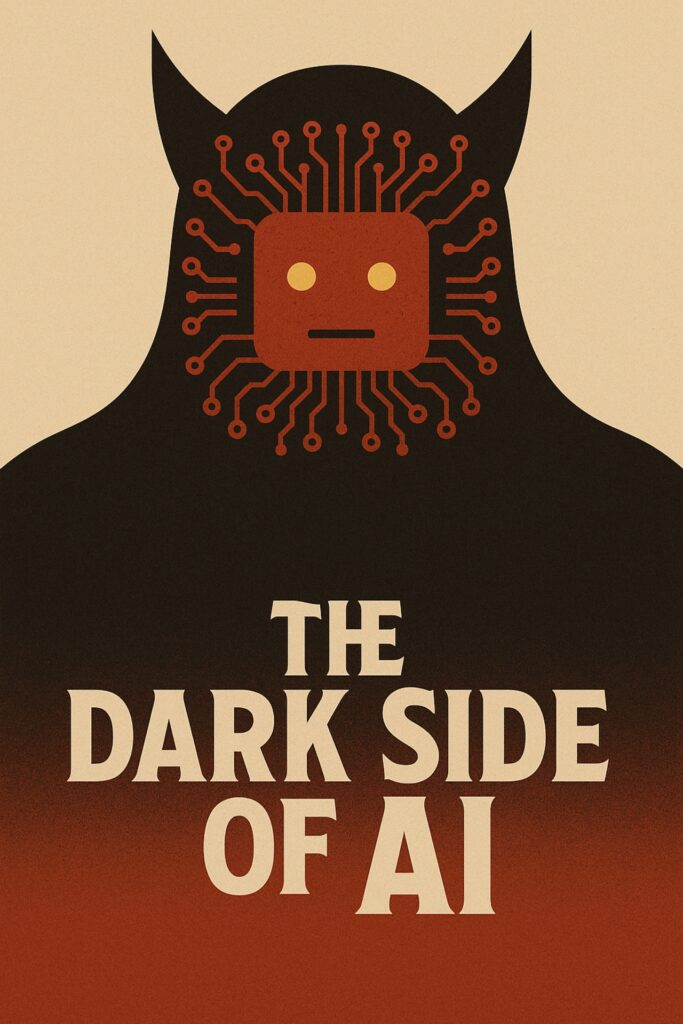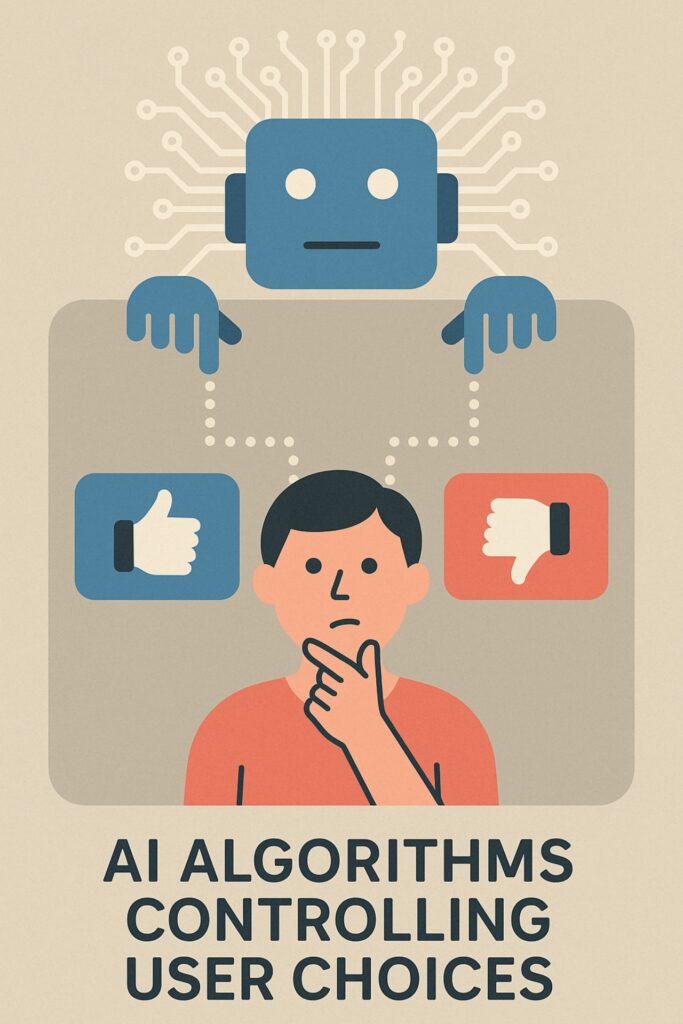You know that eerie feeling when Instagram shows you exactly the pair of shoes you were just thinking about? Or when YouTube “Up Next” video feels like it is reading your mind? I have been there too. A few months ago, I absentmindedly searched for hiking backpacks, and suddenly every app I opened bombarded me with ads for trail gear. It was not magic; it was an AI algorithm. Which is why you need to know about the dark side of AI.
As a psychologist, I have spent years studying how technology influences behaviour. But even with that I have been stunned by how subtly AI algorithms shape our choices, from what we buy to how we vote. Let us pull back the curtain on AI’s hidden tactics and learn its algorithms, why they work, and how you can stay in charge.

Table of Contents
How AI Algorithms Work: The Engine Behind Manipulation

1. Data Collection & Personalization: They Know You Better Than You Think
AI starts by vacuuming up your data secretly. Every click, scroll, and pause is tracked. I once tested this by talking about cat toys near my phone (yes, out loud). Within hours, my Facebook feed was full of cat towers. Creepy? Absolutely.
Key Tools for AI Data Collection:
- Cookies track your browsing history.
- Location data reveals where you live, work, and shop.
- Voice assistants (like Alexa) “listen” for keywords.
2. Predictive Analytics: Your Future Can Be Predicted
Don’t be surprised that AI does not just know your past, it can also guess your future. Do you know of Amazon’s “Frequently Bought Together” feature? That is predictive analytics that is in play. During the pandemic, I noticed my grocery app pushing comfort foods after I had a stressful week. I believe the algorithm had learnt my coping habits.
How Predictive Analytics Works:
- Machine learning spots patterns (e.g., “People who buy X also buy Y”).
- Algorithms test what hooks you (e.g., flash sales vs. countdown timers).
Psychological Triggers Exploited by AI
1. Cognitive Biases: Why You Can’t Resist
AI algorithms have the capacity to prey on your mental shortcuts. For example:
- Confirmation Bias: Social media shows you content that aligns with your beliefs, deepening divides. Some days ago after I liked a post about climate change, my feed became an echo chamber of environmental posts, I was bombarded from left, right, and centre.
- Anchoring Effect: Have you ever noticed how apps show a “$299” price slashed to “$99”? Your brain latches onto the first number, and that makes the deal feel irresistible.
A client once told me she felt validated by her antivax feed until she realised it was filtering out opposing views.
2. Dopamine Loops: The Addictive Scroll
Apps like TikTok and Instagram use infinite scroll to keep you hooked. I experimented with this by timing my TikTok use so that within 10 minutes, I would laugh at 20 videos. After some time I felt a rush of dopamine and completely lost track of time.
How Dopamine Loops Work
- Notifications (“5 new updates!”) trigger FOMO.
- Variable rewards (random likes or viral posts) keep you coming back.
3. FOMO & Social Proof: “Hurry, Only 2 Left!”
Online retailers use urgency tactics in most of their advertisements. Last week, I lingered on a skincare product and saw a pop up: “12 people are viewing this now!” Suddenly, I felt the rush to buy, even though I did not need it.

Real World Examples of Algorithmic Manipulation
1. Social Media Echo Chambers
In 2020, a friend of mine complained that his feed only showed protests, and another friend of his only showed police. Both thought their view was “the whole story”. Algorithms amplify extremes because conflict keeps us engaged.
2. E-Commerce: The Impulse To Buy Trap
Dynamic pricing changes costs based on how well people demand for the product. I once booked a hotel, then I refreshed the page immediately and saw the price jump $50. If you have noticed, the airlines and Uber use this too.
3. Mental Health Apps: Well Intention or Dangerous?
An app that counts calories, which I once reviewed, labelled a salad as “good” and pizza as “bad”. For someone with a disorder, this could reinforce harmful habits in them.
The Ethical and Psychological Fallout
1. Autonomy Erosion: Who’s Really Deciding?
We are outsourcing most of our choices to AI. A teen I counselled said, “Spotify’s playlists know my music taste better than I do.” Convenient? Yes. But this simple act of negligence dulls our decision-making muscles.
2. Mental Health Risks
You must understand that constant comparison on social media can cause anxiety for individuals. One patient told me, “I feel like a failure when I see everyone’s ‘perfect’ lives. Not knowing that those lives can be curated by AI.
3. Who is Responsible?
When a biased hiring algorithm rejects qualified candidates, who is liable for such a loss? Tech companies? Lawmakers? We are still figuring this out.
How to Protect Yourself From Ai Manipulation
1. Boost Digital Literacy
- Audit permissions: Turn off location tracking for non-essential apps (I did this and saw 30% fewer targeted ads).
- Use privacy tools: Try DuckDuckGo for search or NordVPN for browsing to avoid ai manipulations on the web.
2. Mindful Consumption
- Set app timers (I limit Instagram to 20 mins/day).
- Pause before buying: “Is this my choice or the algorithm’s?”
3. Demand Transparency
Support laws like GDPR and California’s Consumer Privacy Act. Ask companies, “How does your AI work?”
Conclusion: Taking Back Control From Ai Algorithms
AI is not evil but it is not neutral. By understanding its tricks, we can outsmart it. Next time you feel rushed to click “buy” or doomscroll, remember that you hold the power to do or not to do. Share this article to help others see the invisible strings.
FAQs
Can AI algorithms create biased content
Yes, AI can reinforce biases by filtering content based on user preference, leading to echo chambers and misinformation.
How do I stop AI from tracking me?
Use incognito mode and ad blockers, and opt out of data sharing in app settings.
How can i protect myself from AI manipulation
Use privacy tools, limit app tracking, and critically evaluate online content before making decisions.
Are Ai algorithms regulated for ethical concerns
Some laws like GDPR and California’s Consumer Privacy Act, aim to regulate AI, but many ethical concerns remain unresolved.


